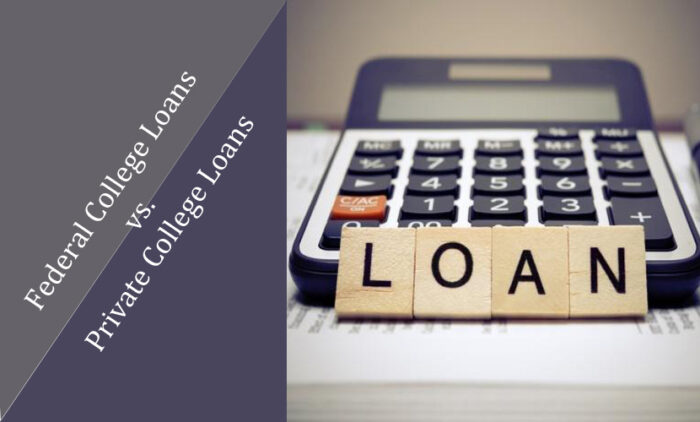Private vs. Federal College Loans – If you’re exploring ways to fund your college education, both private and federal college loans can serve as sources of financial aid.

Private student loans are offered by various lenders, while federal loans are exclusive to the federal government.
However, the distinction between private and federal college loans often raises questions. And both types will be examined here. Therefore, we implore you to stick with us until the end of this blog post to be enlightened.
What Is A Private Student Loan?
A private student loan is an educational loan typically offered by credit unions, private lenders, online companies, and banks. To secure this loan, you usually need to undergo a credit check. If you have a good credit history, you can qualify for favorable loan terms and receive quick approval.
However, many students may face challenges in qualifying for this type of loan independently. Nevertheless, you have the option to apply with a co-signer, which can enhance your chances of approval.
Pros And Cons
Pros:
Although federal student loans are the most recommended option for students, there are still some benefits that you enjoy when you choose a private loan:
- Flexible loan terms.
- Access to higher loan amounts.
- There are no upfront fees.
- Hard to get.
Cons:
While there are good sides to getting a private loan, there are also downsides. They include;
- High-interest rates.
- You will have to search for lenders on your own.
- No protection.
- Credit check.
- There are no loan forgiveness programs.
What Is A Federal Student Loan?
A federal student loan is an educational loan exclusively available through the United States Department of Education. Regardless of the loan type, the interest rate remains consistent for all borrowers.
Federal student loans provide various benefits, offering affordability and flexibility in repayment. When it comes to financing education, federal loans stand out as the preferred option. Moreover, there are different types of federal student loans tailored to meet diverse needs.
Pros and Cons
Pros:
Below are some of the benefits and advantages of a federal college loan:
- Income-driven repayment plans are available.
- If you experience a loss or become disabled, your loan will be discharged.
- You can access student loan forgiveness programs.
- There are few or no credit requirements.
- Postponement options.
- Low interest rates.
Cons:
Here are some of the drawbacks of getting a federal student loan:
- Origination fees.
- Loan limits.
- Unable to choose a loan provider.
- If you are a PLUS borrower, a federal student loan is not the best option.
- Upfront fees.
Private vs. Federal College Loans: Which One Is Best for Me?
This is a common question among students, along with inquiries about the differences between them. Is a federal student loan better than a private student loan? Let’s explore the details.
The choice between federal and private student loans depends on your financial circumstances. Federal loans stand out as the preferred starting option for parents and college-bound students due to their numerous benefits and protections. These include repayment programs, fixed interest rates, and subsidies.
However, there are instances where considering a private student loan is appropriate. If you’ve reached your federal student loan limit, private loans can be used to refinance your education.
Also, if you’re a professional college student or a graduate facing high-interest rates on federal loans, comparing rates from different private lenders can help you secure a more favorable offer.
Private vs. Federal College Loans: What’s the Difference?
For a better understanding of the differences between a private college loan and a federal college loan, this table will explain things a lot better.
| Private Student Loan | Federal Student Loan | |
| Loan Terms | 5 to 20 years | 10 years (standard term) |
| Interest Rates | 4.42% to 16.99% fixed to 16.99% variable | 5.50% to 8.05% |
| Origination fee | Vary | 4.228% for direct PLUS loans and 1.057% for fixed APRs for direct loans |
| Main drawbacks | Few borrowers’ protection and high-rate caps | There are no variable rates and higher rates for good-credit borrowers. |
| Co-signer requirements | No | Yes |
| Loan amounts | Up to 100% of the total cost of attendance | Up to $57,500 for independent undergraduates, $31,000 for dependent undergraduates, and $138,500 for professional students. |
| Best for | Borrowers with good credit | Most borrowers |
| Where to apply | Lender websites | FAFSA |
| Loan Forgiveness | No | Yes |
| Offers subsidized loans | No | Yes |
With help from this table, you should be enlightened on the difference and be able to make the best decision or choice when choosing a good student loan.
See Also: Best Student Loan Refinancing Companies

